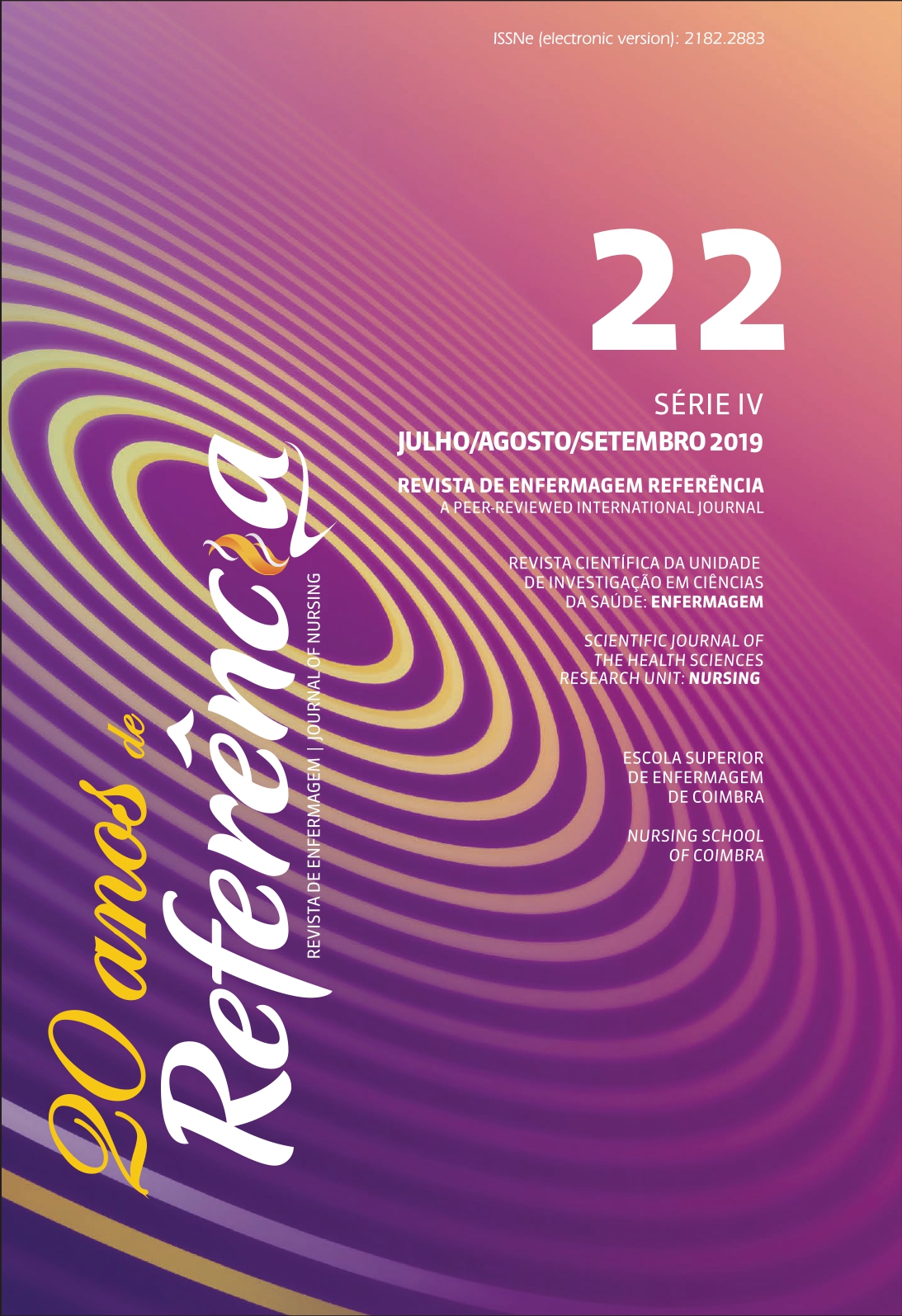Psychosocial risks of nurses who provide care to critically ill patients
DOI:
https://doi.org/10.12707/RIV19018Keywords:
occupational risks, nurses, critical careAbstract
Background: Psychosocial risks are a growing public health problem which, within the context of the care delivery to critically-ill patients, can affect the quality of care provided by health professionals.
Objective: To identify the psychosocial risks of Portuguese nurses who provide care to critically ill patients.
Methodology: Quantitative and cross-sectional study, with a non-probabilistic sample of nurses (n = 61) who work in pre-hospital emergency care (n = 6), emergency rooms (n = 20), and intensive care units (n = 35), in northern Portugal. The COPSOQ II questionnaire was applied between July and December 2018. A descriptive and exploratory analysis of the data was carried out, using the SPSS® software.
Results: There was a moderate to high risk in 20 of the 29 dimensions evaluated by the questionnaire, and significant differences among the nurses of the emergency rooms and intensive care stand out, particularly in leadership quality, job satisfaction, and offensive behavior.
Conclusion: The dimensions related to the area of management emerged as the main focus of psychosocial risks.
Downloads
References
Abdul Rahman, H., Abdul-Mumin, K., & Naing, L. (2017). Psychosocial work stressors, work fatigue, and musculoskeletal disorders: Comparison between emergency and critical care nurses in Brunei Public Hospitals. Asian Nursing Research, 11(1), 13–18. doi: 10.1016/j.anr.2017.01.003
Aiken, L. H., Sloane, D. M., Bruyneel, L., Heede, K. V., Griffiths, P., Busse, R., … Sermeus, W. (2014). Nurse staffing and education and hospital mortality in nine European countries: A retrospective observational study. The Lancet, 383(9931), 1824–1830. doi: 10.1016/S0140-6736(13)62631-8
Dempsey, C., & Assi, M. J. (2018). The impact of nurse engagement on quality, safety, and the experience of care: what nurse leaders should know. Nursing Administration Quarterly, 42(3), 278–283. doi: 10.1097/NAQ.0000000000000305
Dempsey, C., Reilly, B., & Buhlman, N. (2014). Improving the patient experience: Real-world strategies for engaging nurses. Journal of Nursing Administration, 44(3), 142–151. doi: 10.1097/NNA.0000000000000042
European Agency for Safety and Health at Work. (2011). Occupational health and safety risks in the healthcare sector: Guide to prevention and good practice. Luxembourg: Publications Office of the European Union. doi: 10.2767/27263
European Agency for Safety and Health at Work. (2013a). EU-OSHA multi-annual strategic programme 2014-2020. Recuperado de https://osha.europa.eu/en/tools-and-publications/publications/corporate/eu-osha-multi-annual-strategic-programme-2014-2020/view
European Agency for Safety and Health at Work. (2013b). Guia da campanha: Gestão do stresse e dos riscos psicossociais no trabalho. Bilbau, Espanha: Autor. doi: 10.2802/59689
European Agency for Safety and Health at Work. (2018). Riscos psicossociais e stresse no trabalho. Recuperado de https://osha.europa.eu/pt/themes/psychosocial-risks-and-stress
Ilić, I. M., Arandjelović, M. Z., Jovanović, J. M., & Nešić, M. M. (2017). Relationships of work-related psychosocial risks, stress, individual factors and burnout: Questionnaire survey among emergency physicians and nurses. Medycyna Pracy, 68(2), 167–178. doi: 10.13075/mp.5893.00516
Jesus, E., Pinto, A. M., Fronteira, I., & Mendes, A. M. (2014). Estudo Rn4Cast em Portugal: Percepção dos enfermeiros sobre Burnout. Revista Investigação Em Enfermagem, 2(9), 47–59. Recuperado de http://www.sinaisvitais.pt/images/stories/Rie/Rie9_Serie2.pdf
Jesus, E., Roque, S., & Amaral, A. F. (2015). Estudo Rn4Cast em Portugal: Ambientes de prática de enfermagem. Revista Investigação Em Enfermagem, 13(2), 26–44. Recuperado de https://www.researchgate.net/publication/289537196_Estudo_RN4Cast_em_Portugal_ambientes_de_pratica_de_enfermagem
Maguire, B. J., O’Meara, P., O’Neill, B. J., & Brightwell, R. (2018). Violence against emergency medical services personnel: A systematic review of the literature. American Journal of Industrial Medicine, 61(2), 167–180. doi: 10.1002/ajim.22797
Malloy, T., & Penprase, B. (2010). Nursing leadership style and psychosocial work environment. Journal of Nursing Management, 18(6), 715–725. doi: 10.1111/j.1365-2834.2010.01094.x
Manning, J. (2016). The influence of nurse manager leadership style on staff nurse work engagement. The Journal of Nursing Administration, 46(9), 438–443. doi: 10.1097/NNA.0000000000000372
Pejtersen, J. H., Kristensen, T. S., Borg, V., & Bjorner, J. B. (2010). The second version of the Copenhagen Psychosocial Questionnaire. Scandinavian Journal of Public Health, 38(Supl. 3), 8–24. doi: 10.1177/1403494809349858
Pinto, A. M., Jesus, E., Mendes, A. M., & Fronteira, I. (2015). Estudo RN4CAST em Portugal: Work engagement dos enfermeiros. Revista Investigação Em Enfermagem, 10(2), 26–37. Recuperado de https://run.unl.pt/bitstream/10362/36965/1/EstudoRN-4CastemPortugal_WorkEngagementdosEnfermeiros.pdf
Silva, C., Amaral, V., Pereira, A., Bem-haja, P., Pereira, A., Rodrigues, V., … Nossa, P. (2014). Versão portuguesa do Copenhagen Psychosocial Questionnaire COPSOQ: Portugal e países africanos de língua oficial portuguesa. In Manual sobre riscos psicossociais no trabalho (pp. 347–369). Porto, Portugal: RICOT. Recuperado de https://www.researchgate.net/publication/288858166_Copenhagen_Psychosocial_Questionnaire_II_Portugal_e_Paises_Africanos_de_Lingua_Oficial_Portuguesa
World Health Organization. (1984). Psychosocial factors at work : Recognition and control. Safety and health. Recuperado de https://www.who.int/occupational_health/publications/ILO_WHO_1984_report_of_the_joint_committee.pdf






















